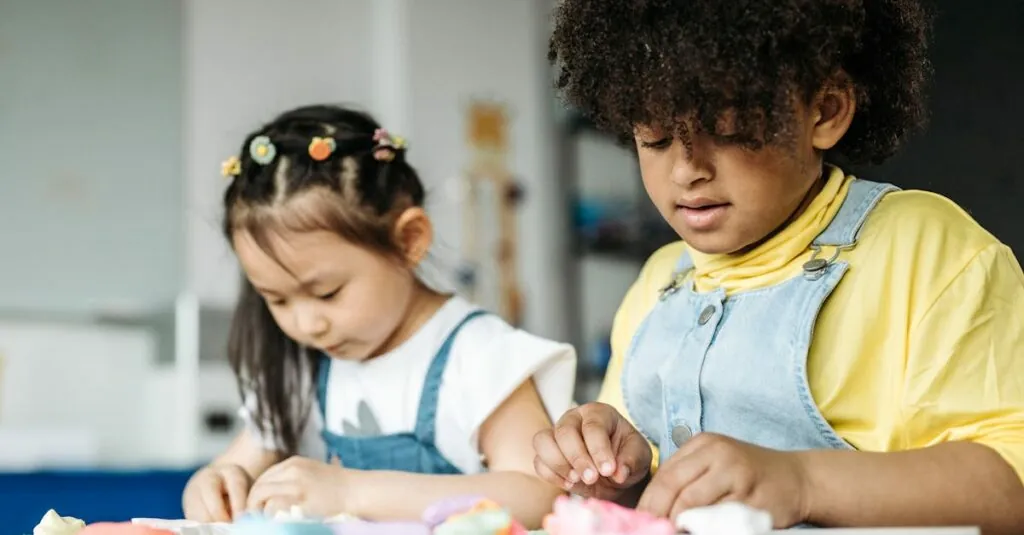Siblings can be the best of friends or the ultimate frenemies, depending on the day. But what if there was a way to turn those squabbles into collaborative fun? Enter Montessori activities designed specifically for siblings! These engaging, hands-on experiences not only promote learning but also encourage teamwork and camaraderie.
Imagine watching your kids work together to build a tower that doesn’t wobble or create a masterpiece of art without the usual sibling rivalry. Montessori activities are all about fostering independence while nurturing cooperation. Plus, they keep the little ones occupied and out of trouble—what more could a parent ask for? Get ready to discover how these playful learning experiences can transform sibling dynamics into something truly magical.
Table of Contents
ToggleUnderstanding Montessori Activities
Montessori activities engage children in purposeful play while fostering independent learning. These activities allow siblings to explore their interests together, enhancing their interactions.
What Are Montessori Activities?
Montessori activities consist of hands-on tasks that promote exploration and problem-solving. These tasks include practical life exercises, sensory play, and creative arts. Children learn through direct experience and interaction with materials designed for their developmental stages. These activities encourage autonomy, where children make choices and take responsibility for their learning. Engaging in these activities helps siblings connect and collaborate, creating a rich social environment.
The Benefits of Montessori Approach for Siblings
Montessori fosters cooperation between siblings through shared activities. Children learn patience and cooperation while working together on tasks. Independence is a key aspect, as they become confident in their abilities. Engaging in problem-solving activities builds critical thinking skills, allowing siblings to support each other’s growth. These experiences nurture empathy and understanding, strengthening their bond. Ultimately, the Montessori approach cultivates a positive atmosphere that transforms rivalries into teamwork.
Popular Montessori Activities for Siblings
Montessori activities promote sibling collaboration through engaging and purposeful play. This section highlights several popular types of activities suited for siblings.
Practical Life Activities
Practical life activities encourage siblings to work together while developing essential life skills. Tasks such as cooking, cleaning, or gardening not only teach responsibility but also foster teamwork. Involving siblings in preparing a simple meal can enhance their ability to cooperate and communicate effectively. They can help with measuring ingredients, washing vegetables, or setting the table. These experiences cultivate independence and facilitate learning through shared responsibilities.
Sensorial Activities
Sensorial activities stimulate children’s senses while encouraging exploration. Siblings can benefit from sorting objects by texture, size, or color, enhancing their observation skills together. Setting up a sensory bin filled with rice, beans, or water beads provides endless opportunities for them to collaborate. As they engage in these playful experiences, siblings learn to articulate their observations and share their thoughts. This type of interaction promotes creativity and strengthens their relationship.
Creative Arts and Crafts
Creative arts and crafts allow siblings to express themselves while collaborating on projects. Activities like painting, sculpting with clay, or making collages enhance fine motor skills and encourage imaginative play. Siblings can collaborate on a large mural, sharing ideas and techniques as they work together. Bonding occurs naturally during these artistic endeavors, fostering communication and mutual appreciation for each other’s creativity. These shared experiences also boost their confidence and self-esteem.
Implementing Montessori Activities at Home
Creating a home environment that supports Montessori principles enhances sibling interactions and promotes learning. Thoughtful arrangements encourage independence and shared experiences among siblings.
Setting Up a Montessori Environment
Begin by designating specific areas for activities. Organize materials at child-height, ensuring accessibility. Use natural light to create a welcoming atmosphere, which fosters concentration and curiosity. Incorporate a variety of materials, such as books, art supplies, and sensory tools, that stimulate exploration. Rotate activities regularly to maintain interest. Keep the environment clutter-free to minimize distractions and promote focus on collaborative tasks.
Tips for Engaging Siblings Together
Choose activities that encourage teamwork and mutual assistance. Select practical life tasks, like cooking or gardening, to develop essential skills while working side by side. Introduce games that require cooperation, fostering communication and problem-solving together. Encourage sibling-led projects, allowing them to take the initiative in creating something unique. Celebrate their achievements together, reinforcing the bond they share. Rotate responsibilities so each child contributes, promoting a sense of ownership and collaboration.
Observations and Outcomes
Montessori activities significantly affect sibling relationships, fostering collaboration and reducing rivalry. Engaging in shared experiences helps siblings develop mutual understanding and empathy.
How Siblings Interact with Each Other
Through Montessori activities, siblings engage in meaningful dialogue and cooperation. Communication expands as children collaborate on tasks, leading to improved social skills. Working together encourages them to respect each other’s ideas and feelings. Siblings learn to negotiate, share, and resolve conflicts constructively. The hands-on nature of these activities promotes shared experiences that enhance their bond. Younger siblings often observe and learn from their older siblings during these interactions. Creative problem-solving tasks encourage them to brainstorm together, enhancing their relationships.
Developmental Benefits for Each Child
Each child benefits developmentally from participating in Montessori activities. Independence emerges as they take on responsibilities and oversee their projects. Cognitive skills sharpen through problem-solving and exploration, offering hands-on learning opportunities. Social skills develop as they interact and communicate during tasks, promoting teamwork. Emotional growth occurs with each cooperative effort, nurturing patience and resilience. By working together, siblings also cultivate conflict resolution skills, preparing them for future challenges. Overall, engaging in these activities enriches their individual experiences while strengthening their connection as siblings.
Conclusion
Montessori activities offer a unique opportunity for siblings to bond while developing essential skills. By engaging in collaborative tasks children not only learn to work together but also foster a deeper understanding of one another. These shared experiences create a nurturing environment where rivalries can transform into teamwork.
As siblings explore and create together they build confidence and empathy. The Montessori approach encourages independence while promoting cooperation which ultimately enriches their relationships. Implementing these activities at home can lead to lasting positive dynamics that benefit each child’s growth and development. Embracing this method can truly enhance the sibling experience, turning everyday interactions into meaningful connections.







